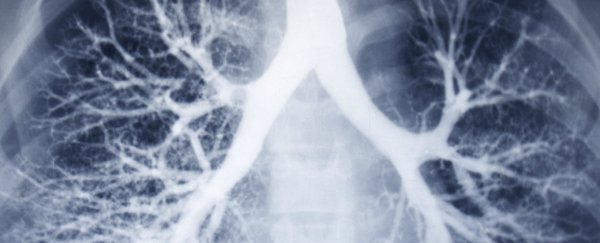For the first time, gene therapy has been shown to significantly improve lung function in patients with cystic fibrosis in phase 2 trials in the UK.
The researchers admit that the results were modest and inconsistent, but they demonstrate that the therapy is safe and effective for human use. They're now planning a larger trial with higher and more frequent doses. If all goes to plan, they think they'll be able to find a treatment that helps a wider range of patients by 2020.
"Patients who received the gene therapy showed a significant, if modest, benefit in tests of lung function compared with the placebo group and there were no safety concerns," lead researcher Eric Alton from Imperial College London said in a press release. "Whilst the effect was inconsistent, with some patients responding better than others, the results are encouraging."
Cystic fibrosis is an inherited condition caused by mutations in a single gene, known as 'cystic fibrosis transmembrane conductance regulator'. The condition greatly reduces a patient's lifespan by causing their body to overproduce a thick mucus, which can lead to life-threatening lung infections.
Seeing as the problem is limited to one gene, in theory, it should be easy to fix. But since the faulty gene was discovered 25 years ago, researchers have been working on different ways to introduce a healthy version to patients' lung cells without success - until now.
The new treatment contains healthy DNA molecules encased in fat globules and is delivered via a nebuliser. Over a year, 136 patients with cystic fibrosis over the age of 12 were either given monthly doses of the gene therapy, or a saline placebo.
The 62 patients who'd received the gene therapy all performed better in lung function tests at the end of the trial than those given the placebo. In most patients, this meant that the treatment didn't improve lung function, but kept it the same over the trial period, while those who took the placebo got worse. But in some patients the therapy actually made their lungs better.
"In particular, in the half of patients with the worst lung function at the start of the study, there was a doubling of the treatment effect," said Alton. The results have been published in The Lancet Respiratory Medicine.
The team is now looking into how they can bring the same benefits to a broader range of patients. They also hope they can reduce the frequency of treatments required.
"Stabilisation of lung disease in itself is a worthwhile goal," said co-researcher Stephen Hyde from the University of Oxford. "We are actively pursuing further studies of non-viral gene therapy looking at different doses and combinations with other treatments, and more efficient vectors."
Alton told Sarah Boseley over at The Guardian that if these trials go well, "it would be feasible to have a treatment to improve lung function available for patients by the end of the decade".
This is the kind of trial result that might not seem that headline-worthy, but now that the researchers have shown that their delivery method can work and is safe, they can tweak the system to work more effectively. It also means they are a lot closer to finding safe a combination that helps minimise lung damage, or ideally prevent it before it occurs. With roughly 90,000 people diagnosed with cystic fibrosis around the world, that's definitely something we need.
